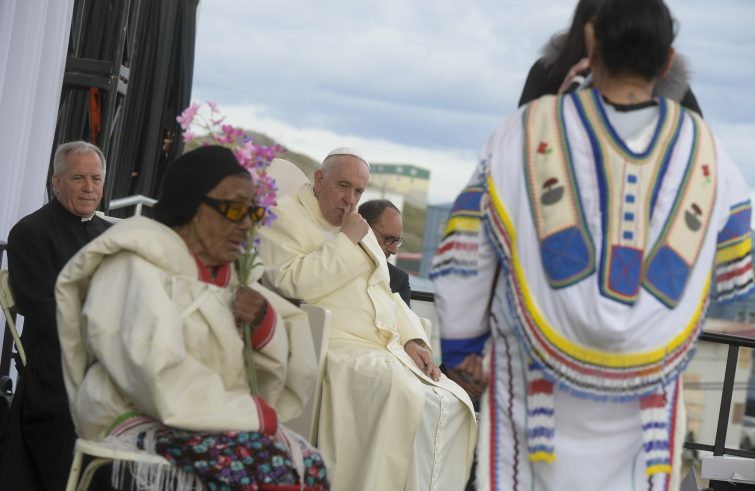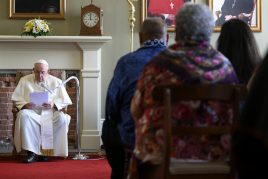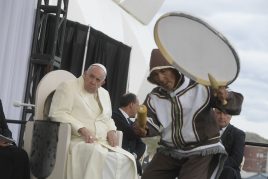
“Today too, in this place, I want to tell you how very sorry I am and to ask for forgiveness for the evil perpetrated by not a few Catholics who, in these schools, contributed to the policies of cultural assimilation and enfranchisement.” On the last day of his visit to Canada, meeting with young people and the elderly in Iqaluit, 300 kilometres from the Arctic Circle, the Pope renewed his plea for forgiveness for abuses committed in residential schools, one of which – the Nakasuk Primary School – was a private visit, where he met and listened to the testimonies of several alumni. Francis mentioned “the forced assimilations, when children were separated from their parents and their own nation was perceived as dangerous and foreign”, a “scandal” that causes “pain.”
“How evil it is to break the bonds uniting parents and children, to damage our closest relationships, to harm and scandalize the little ones!”, the Pope said renewing the sentiments of his “mea culpa”: “we are here with the desire to pursue together a journey of healing and reconciliation that, with the help of the Creator, can help us shed light on what happened and move beyond the dark past.”

Meeting with a delegation of indigenous people in Quebec, on the last day of his journey there, Francis outlined the significance of what he had described as “a penitential pilgrimage” before his departure: “I have come to Canada as a friend in order to meet you and to see, hear, learn and appreciate how the indigenous populations of this country live. I have come as a brother, to discover firsthand the good and bad fruit borne by members of the local Catholic family in the course of the years. I have come in a spirit of penance, to express the pain that we carry in our hearts as Church for the wrong inflicted on you by not a few Catholics who supported oppressive and unjust policies in your regard.”
“I have come as a pilgrim, despite my physical limitations, to take further steps forward with you and for you”,
Francis went on to explain: “I do this so that progress may be made in the search for truth, so that the processes of healing and reconciliation may continue, and so that seeds of hope can keep being sown for future generations – indigenous and non-indigenous alike – who desire to live together, in harmony, as brothers and sisters.”
“To start to weave anew a reconciliation that can uphold the rights of the most vulnerable in our midst and look at history without resentment or forgetfulness”,
is the desired goal, entrusted to the intercession of three women: St Anne, Mary and St Kateri Tekakwitha, the first ever Native American saint.
“I am now returning home greatly enriched.
I bear in my heart the incomparable treasure of all those individuals and peoples who have left a mark on me; the faces, smiles and messages that remain with me; the unforgettable stories and natural beauties; the sounds, colours and emotions that touched me deeply”, said the Pope. “I can truly say that, while I came to be with you, it was your life and experiences, the indigenous realities of these lands, that have touched me, remained with me, and will always be a part of me.”, he assured: “I dare say, if you will allow me, that now, in a certain sense,
I also feel a part of your family, and for this, I am honoured.”

In Iqaluit, the Pope praised the indigenous peoples’ relationship with Creation: “Here is a beautiful and harmonious relationship between you and this land you inhabit, because it too is strong and resilient, and responds with brilliant light to the darkness that enshrouds it”, the Pope’s words: “Yet this land, like every individual and every people, is also fragile, and needs to be cared for. Caring, teaching and learning how to care: to this task young people in particular, supported by the example of their elders, have been called! Care for the earth, care for your people, care for your history.” Finally, engaging in an ideal dialogue with “the Inuit youth”, Francis entrusted them with demanding tasks, premising that
“It is not enough to live off the past, it is necessary to earn what was given to you as a gift.”
“Keep walking upwards – was the Pope’s first piece of advice – without letting yourself get dragged down by those who would have you believe that it is better to think only of yourself and to use your time solely for your leisure and your interests.”
“You were not made ‘to get by’”,
the Pope remarked: “Don’t think that life’s great dreams are as unattainable as the sky above”, in a world “that seems constantly to be dragged down by scandals, wars, fraud, injustice, environmental destruction, indifference towards those in need, disillusionment from those who should be giving an example. The future is even in your hands. So never lose hope, fight, give it your all, and you will not be sorry.” It is the serious case of freedom, which “is not total caprice, but responsibility”, as we are told by the “great poet” Charles Peguy, who wrote memorable pages on the subject of freedom, starting with a father’s dream for his son.











